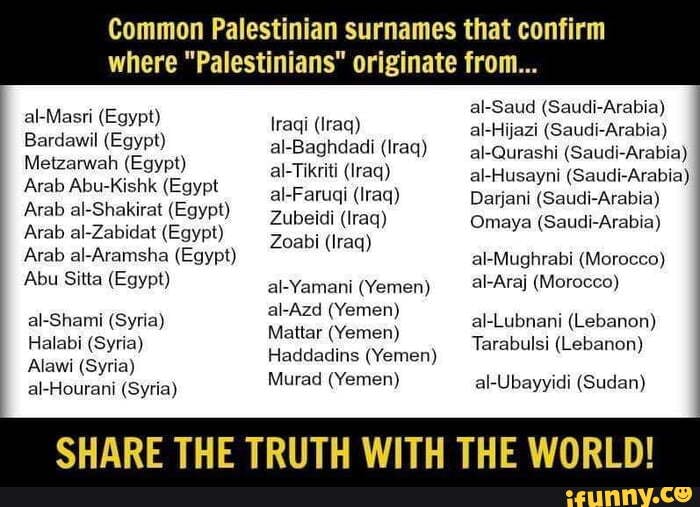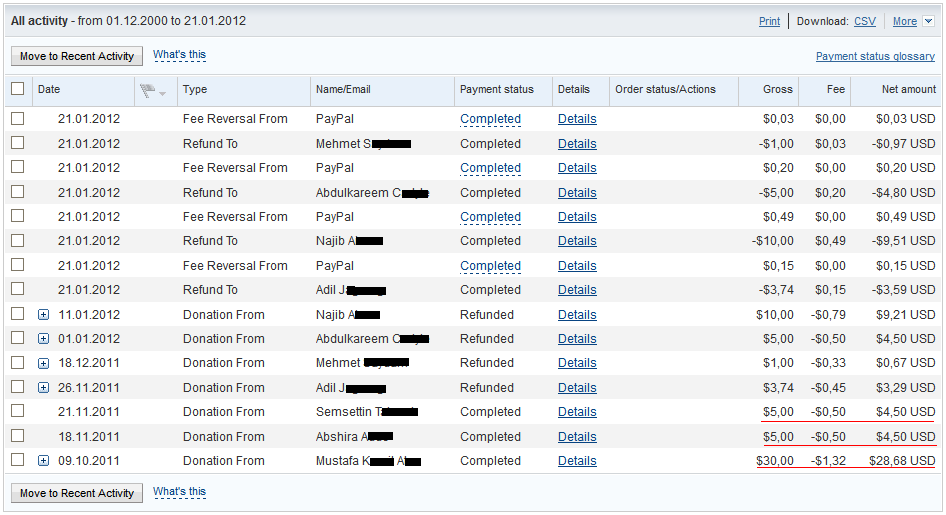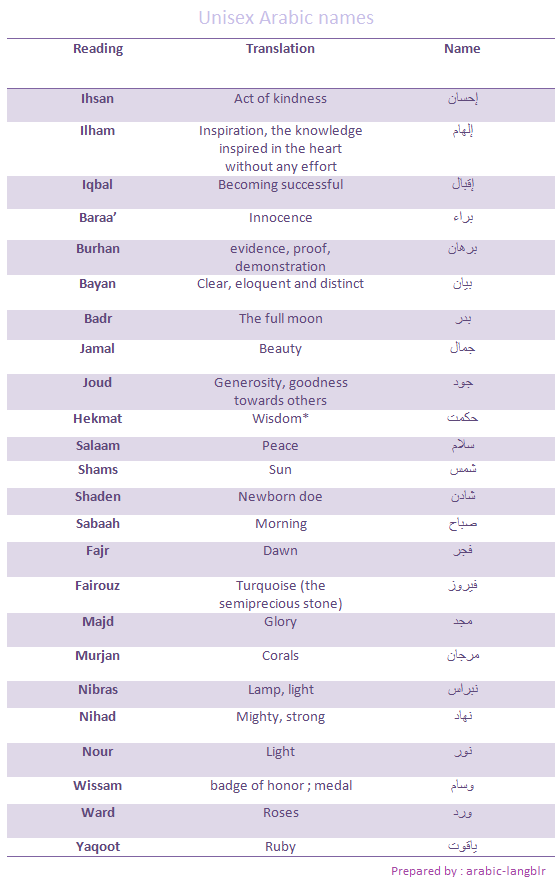25+ Common Palestinian Surnames In Arabic And English
Common Palestinian surnames are family names that are widely used among the Palestinian population. They often have historical, cultural, and geographical significance.
The importance of common Palestinian surnames lies in their ability to establish a sense of identity, trace ancestry, and connect individuals to their cultural heritage. Surnames can also provide insights into the diverse origins and backgrounds of the Palestinian people.
Some of the most common Palestinian surnames include: Abu Ghosh, Arafat, Barghouti, Habash, Haniyeh, Hussein, Jaber, Khalil, Masri, Nashashibi, Qurei, and Tamimi. These surnames reflect the rich history of Palestine, with influences from Arabic, Islamic, and Canaanite cultures.
- Janice Nichole Nude A Deeper Look Into Her Life And Career
- Hdhub4ucom Your Ultimate Destination For Entertainment
Common Palestinian Surnames
Common Palestinian surnames are an integral part of Palestinian identity and culture, providing insights into the rich history and diverse origins of the Palestinian people.
- Identity: Surnames establish a sense of belonging and connection to a shared heritage.
- History: Surnames often reflect historical events, geographical locations, or family occupations.
- Culture: Surnames embody cultural traditions and values, passed down through generations.
- Ancestry: Surnames serve as a link to ancestral roots, tracing family lineages over time.
- Diversity: The variety of Palestinian surnames reflects the diverse origins and backgrounds of the Palestinian population.
- Geography: Surnames can indicate the place of origin or ancestral home of a family.
- Connection: Surnames foster a sense of community and connection among Palestinians worldwide.
In conclusion, common Palestinian surnames are not mere identifiers but rather a reflection of the rich tapestry of Palestinian history, culture, and identity. They provide a tangible connection to the past and a sense of belonging for Palestinians around the world.
1. Identity
Common Palestinian surnames are deeply connected to the concept of identity, fostering a sense of belonging and connection to a shared heritage. Surnames serve as markers of Palestinian identity, uniting individuals with a common history and culture.
- Chip Gaines Heart Attack The Latest Updates And News You Need To Know
- Crystal Lust The Heartbreaking Tale Of A Sad Ending
The importance of surnames in establishing identity is evident in Palestinian society. Families take pride in their surnames, which are often passed down through generations. Surnames can indicate membership in a particular tribe, clan, or village, creating a sense of communal belonging.
For example, the surname "Barghouti" is common among Palestinians from the Barghouthiya clan, which has roots in the Ramallah area. The surname "Tamimi" is associated with the Tamim tribe, which has a long history in Palestine. These surnames not only identify individuals but also connect them to a wider Palestinian community.
Moreover, common Palestinian surnames contribute to a sense of shared heritage. By carrying the names of their ancestors, Palestinians maintain a tangible link to their past and the struggles and triumphs of their people. Surnames embody the collective memory and experiences of the Palestinian community, fostering a sense of continuity and cultural resilience.
In conclusion, the connection between "Identity: Surnames establish a sense of belonging and connection to a shared heritage" and "common Palestinian surnames" is profound. Surnames serve as vital markers of Palestinian identity, uniting individuals with a common history and culture, and providing a tangible link to their shared heritage.
2. History
Common Palestinian surnames often carry historical significance, reflecting the rich tapestry of events, geographical locations, and family occupations that have shaped Palestinian identity.
- Historical Events: Many Palestinian surnames are tied to key historical events or periods. For example, the surname "Arafat" is associated with the prominent Palestinian leader Yasser Arafat, while the surname "Nashashibi" is linked to the Nashashibi family, which played a significant role in Palestinian politics during the British Mandate era.
- Geographical Locations: Surnames can also indicate the place of origin or ancestral home of a family. For example, the surname "Ghassan" is common among Palestinians with roots in the historical region of Ghassan in southern Syria, while the surname "Khalil" is associated with the city of Hebron.
- Family Occupations: Surnames can sometimes reflect the traditional occupations of a family. For example, the surname "Haddad" is common among families of blacksmiths, while the surname "Qattan" is associated with cotton merchants.
In conclusion, the connection between "History: Surnames often reflect historical events, geographical locations, or family occupations" and "common Palestinian surnames" is evident in the way surnames carry historical significance and provide insights into the diverse origins and experiences of the Palestinian people.
3. Culture
Common Palestinian surnames are deeply intertwined with Palestinian culture, embodying cultural traditions and values that have been passed down through generations.
- Family Honor: Surnames carry the reputation and honor of the family. Individuals are expected to uphold the family name by their actions and behavior.
- Religious Beliefs: Surnames can reflect religious beliefs or practices. For example, the surname "Hajj" indicates that a family member has completed the pilgrimage to Mecca.
- Tribal Affiliations: Surnames can indicate membership in a particular tribe or clan. These surnames often reflect the shared history and values of the tribe.
- Cultural Heritage: Surnames are a repository of cultural heritage, connecting individuals to their ancestors and the traditions of their people.
In conclusion, the connection between "Culture: Surnames embody cultural traditions and values, passed down through generations" and "common Palestinian surnames" lies in the way surnames carry cultural significance and provide insights into the beliefs, values, and heritage of the Palestinian people.
4. Ancestry
Common Palestinian surnames are a vital link to ancestral roots, providing a tangible connection to the past and a means of tracing family lineages over time.
- Preservation of Family History: Surnames serve as a repository of family history, preserving the names and lineages of ancestors for generations to come.
- Cultural and Geographic Origins: Surnames can provide clues about the cultural and geographic origins of a family. For example, the surname "Masri" indicates Egyptian ancestry, while the surname "Shami" suggests Syrian roots.
- Tribal Affiliations: Surnames can also indicate membership in a particular tribe or clan, tracing ancestral connections to specific regions or historical events.
- Genetic Genealogy: In recent years, genetic genealogy has emerged as a tool to supplement traditional genealogical research. By analyzing DNA, individuals can gain insights into their ancestral origins and connect with distant relatives who share common surnames.
In conclusion, the connection between "Ancestry: Surnames serve as a link to ancestral roots, tracing family lineages over time" and "common Palestinian surnames" is evident in the way surnames carry ancestral information. They provide a means of preserving family history, uncovering cultural and geographic origins, exploring tribal affiliations, and utilizing genetic genealogy to connect with distant relatives.
5. Diversity
Common Palestinian surnames embody the rich diversity of the Palestinian people, reflecting their diverse origins, cultural influences, and historical experiences.
- Arab Origins: Many common Palestinian surnames have Arabic roots, reflecting the deep connection between Palestinians and the wider Arab world. Surnames like "Abu Ghosh," "Habash," and "Khalil" are examples of Arabic surnames that are widespread among Palestinians.
- Islamic Influence: Islam has had a significant impact on Palestinian culture and society, and this is reflected in the prevalence of surnames with Islamic references. Surnames like "Hajj," indicating one who has performed the pilgrimage to Mecca, and "Abdel," meaning "servant of God," are common examples.
- Canaanite Heritage: Palestine is the historical land of Canaan, and some Palestinian surnames reflect this ancient heritage. Surnames like "Tamimi" and "Ghassan" have Canaanite origins, connecting Palestinians to the indigenous people of the region.
- Foreign Influences: Palestine's history of foreign rule and cultural exchange has also influenced the diversity of surnames. Surnames like "Barghouti," of Turkish origin, and "Qurei," of Persian origin, attest to these foreign influences.
In conclusion, the variety of common Palestinian surnames reflects the diverse tapestry of origins, cultures, and historical experiences that have shaped the Palestinian people. These surnames serve as a reminder of the rich heritage and the multifaceted identity of the Palestinian population.
6. Geography
Common Palestinian surnames often provide insights into the geographical origins and ancestral homes of Palestinian families. This connection is rooted in the historical significance of place and the deep ties between Palestinians and their land.
- Regional Origins:
Surnames like "Masri" (Egyptian) and "Shami" (Syrian) indicate the ancestral origins of families from neighboring regions. These surnames reflect the historical movement and settlement of people across the Levant.
- City and Village Names:
Many Palestinian surnames are derived from the names of cities or villages, such as "Nabulsi" (from Nablus) and "Ramlawi" (from Ramallah). These surnames indicate the ancestral homes of families and their connection to specific localities.
- Tribal Affiliations:
Some Palestinian surnames are associated with tribal affiliations, reflecting the historical organization of society in the region. For example, the surname "Taamri" is linked to the Taamri tribe, which has ancestral ties to the Hebron area.
- Geographical Features:
Surnames can also be derived from geographical features, such as the surname "Gharbi" (western) or "Sharqi" (eastern). These surnames indicate the family's origins in relation to specific geographical landmarks.
In conclusion, the connection between "Geography: Surnames can indicate the place of origin or ancestral home of a family" and "common Palestinian surnames" provides valuable insights into the diverse origins, historical migrations, and deep-rooted ties between Palestinian families and their ancestral lands.
7. Connection
Common Palestinian surnames play a crucial role in fostering a sense of community and connection among Palestinians worldwide. Surnames serve as a unifying force, creating a shared identity and sense of belonging:
- Cultural Identity:
Surnames are an integral part of Palestinian cultural identity. They carry the weight of family history, traditions, and values, connecting individuals to their shared heritage.
- Diaspora Connections:
For Palestinians living in the diaspora, surnames provide a vital link to their homeland and to other members of the Palestinian community. Surnames facilitate connections across borders, fostering a sense of unity and belonging.
- Genealogical Research:
Common Palestinian surnames serve as a starting point for genealogical research, allowing individuals to trace their ancestry and connect with distant relatives. This process strengthens the sense of community by revealing shared lineage and family connections.
- Community Organizations:
Many Palestinian community organizations use surnames as a way to identify and connect with members. This helps to build a network of support and resources within the Palestinian diaspora.
In conclusion, the connection between "Connection: Surnames foster a sense of community and connection among Palestinians worldwide" and "common Palestinian surnames" is profound. Surnames are not merely identifiers but also powerful symbols of shared identity, cultural heritage, and community. They facilitate connections across borders and generations, strengthening the bonds that unite the Palestinian people.
FAQs on Common Palestinian Surnames
This section addresses frequently asked questions to provide a comprehensive understanding of common Palestinian surnames and their significance.
Question 1: What is the importance of surnames in Palestinian culture?
Answer: Surnames in Palestinian culture hold immense value in establishing identity, preserving family history, and connecting individuals to their shared heritage and ancestral roots.
Question 2: How do surnames reflect the history of Palestine?
Answer: Common Palestinian surnames often carry historical significance, reflecting key events, geographical locations, and family occupations that have shaped Palestinian identity and society.
Question 3: What is the connection between surnames and Palestinian cultural traditions?
Answer: Surnames embody cultural traditions and values, such as family honor, religious beliefs, and tribal affiliations. They serve as a testament to the rich cultural heritage of the Palestinian people.
Question 4: How can surnames assist in tracing Palestinian ancestry?
Answer: Surnames provide a link to ancestral roots, allowing individuals to trace their family lineage over time. They can indicate geographical origins, cultural influences, and tribal connections.
Question 5: How do surnames contribute to the diversity of Palestinian society?
Answer: The variety of common Palestinian surnames reflects the diverse origins, cultural influences, and historical experiences of the Palestinian population, showcasing the richness and complexity of Palestinian society.
Question 6: What role do surnames play in fostering a sense of community among Palestinians?
Answer: Surnames serve as a unifying force, creating a shared identity and sense of belonging among Palestinians worldwide. They facilitate connections across borders and generations, strengthening the bonds that unite the Palestinian people.
In conclusion, common Palestinian surnames are not just identifiers but also carry profound cultural, historical, and social significance. They provide valuable insights into the rich tapestry of Palestinian heritage and foster a sense of unity and connection within the Palestinian community.
Transitioning to the next article section: "Common Palestinian Surnames in the Diaspora," which will explore the role of surnames in maintaining cultural identity and community ties among Palestinians living outside of Palestine.
Tips for Understanding Common Palestinian Surnames
Common Palestinian surnames offer a glimpse into the rich history, diverse origins, and cultural traditions of the Palestinian people. To fully appreciate the significance of these surnames, consider the following tips:
Tip 1: Explore the Historical Context: Examine the historical events, geographical locations, and family occupations that have influenced the development of Palestinian surnames. This context provides insights into the origins and meanings of many common surnames.
Tip 2: Consider Cultural Traditions: Palestinian surnames often reflect cultural values, beliefs, and practices. Understanding the significance of family honor, religious affiliations, and tribal connections can help interpret the symbolism and meaning behind surnames.
Tip 3: Trace Ancestral Roots: Surnames serve as a link to ancestral roots. Utilize genealogical research tools and resources to trace family lineages and discover the origins of your surname.
Tip 4: Embrace the Diversity: Recognize the variety of Palestinian surnames, which reflects the diverse origins and cultural influences that have shaped Palestinian society. This diversity showcases the richness and complexity of Palestinian heritage.
Tip 5: Foster a Sense of Community: Surnames play a vital role in fostering a sense of community and belonging among Palestinians. Embrace the shared identity and connections that surnames provide, both within Palestine and in the global diaspora.
Summary of key takeaways or benefits: By following these tips, you can gain a deeper understanding of common Palestinian surnames, their significance in Palestinian culture, and their role in shaping the Palestinian identity.
Transition to the article's conclusion: As you continue to explore the topic of common Palestinian surnames, remember that they are more than just identifiers. They embody the history, traditions, and cultural diversity of the Palestinian people, providing a valuable lens through which to understand their heritage and identity.
Conclusion
Common Palestinian surnames are a testament to the rich history, diverse origins, and cultural traditions of the Palestinian people. They provide valuable insights into the historical events, geographical influences, and social dynamics that have shaped Palestinian society.
Understanding the significance of common Palestinian surnames is not only about memorizing names but also about appreciating the cultural heritage and diverse identities they represent. These surnames embody the resilience, pride, and sense of community that define the Palestinian people. By delving into their meanings and origins, we gain a deeper understanding of the Palestinian experience and the challenges and triumphs they have faced throughout history.



Detail Author:
- Name : Bertrand Leffler
- Username : khand
- Email : brekke.mariano@yahoo.com
- Birthdate : 2001-02-16
- Address : 9250 Conn Mountain Suite 738 East Demond, NV 39807-3483
- Phone : 1-239-632-6696
- Company : Wolf, Keeling and Conroy
- Job : Head Nurse
- Bio : Minus error in quos est quis. Eum iure sed praesentium dolor. Non natus sint distinctio neque ea et libero. Nesciunt in voluptatem numquam nemo.
Socials
facebook:
- url : https://facebook.com/elvie_reinger
- username : elvie_reinger
- bio : Repudiandae soluta ratione illo qui.
- followers : 891
- following : 2249
linkedin:
- url : https://linkedin.com/in/ereinger
- username : ereinger
- bio : Aut et nam sit voluptatibus sapiente aliquid.
- followers : 1818
- following : 2426
tiktok:
- url : https://tiktok.com/@elvie_id
- username : elvie_id
- bio : Et dolorem maiores debitis eos minus. Totam officia velit incidunt impedit.
- followers : 3165
- following : 2992